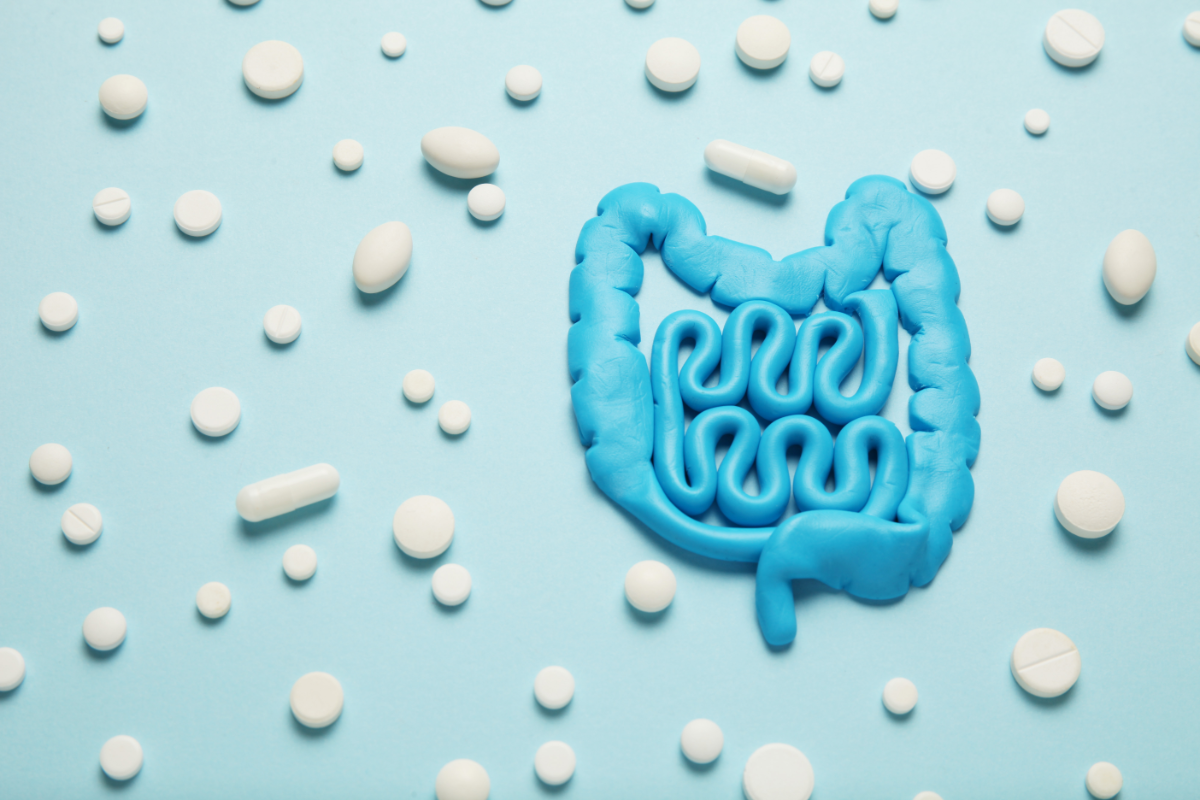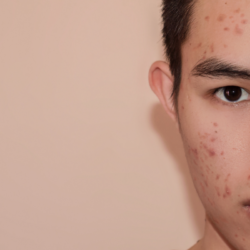Did you know that one in three people in France suffers from a skin disease? That’s according to the Objectif Peau study published in 2017 by the French Dermatology Society. This impressive figure represents around 16 million French people aged 15 and over. Skin conditions such as acne, eczema, psoriasis and mycosis are not just aesthetically embarrassing. They also have a profound impact on the quality of life of those affected. Fortunately, scientific research is now exploring promising new therapeutic avenues, thanks in particular to the link established between the intestinal microbiota and skin health. Probiotics are becoming increasingly popular and are now being included in cosmetics for healthy skin. In fact, they are natural anti-inflammatories and strengthen the skin’s flora. Cosmetics brands often use them in combination with other active ingredients for even more effective skin care.
More about probiotics
Probiotics are living micro-organisms (yeast or bacteria). Present in the body, they are in perfect harmony with viruses, fungi and other micro-organisms. Together, they form the microbiota found in the digestive system and the skin. This microbiota plays an important role in our health, but can sometimes be out of balance (as in the case of Seborrhoeic Dermatitis). This is where probiotics come in. They modulate the proliferation between good and bad bacteria. Indeed, our body’s well-being depends on the harmony of these bacteria to function properly.
Fermented foods such as dairy products, fermented fish, sauerkraut and brewer’s yeast naturally contain probiotics. Regular consumption helps the digestive system to function properly and ensures good intestinal transit.
Probiotics for the skin
Understanding the structure of the skin is crucial to understanding the effectiveness of skincare products. The skin is structured into three main layers:
- Epidermis: This is the skin’s visible outer layer, acting as a protective barrier against external aggression. It is responsible for the skin’s appearance and texture.
- Dermis: Located beneath the epidermis, this layer contains nerves, hair follicles and glands. The dermis is essential for the skin’s firmness and elasticity.
- Hypodermis: The deepest layer, composed mainly of adipose tissue, plays an important role in thermal regulation and shock absorption.
Each layer of the skin has a specific function which influences its general condition and its reaction to skincare products. Understanding this structure is therefore essential for choosing the right skincare products.
While probiotics have already proved their effectiveness on the intestinal microbiota, they are also used in dermo-cosmetics. They offer numerous benefits for skin health. As well as being anti-inflammatory, they strengthen the skin’s flora.
Some brands have understood the benefits of these active ingredients and have incorporated probiotics into their skincare products. And these good bacteria are often combined with other active ingredients such as hyaluronic acid or collagen peptides. In dermo-cosmetics, probiotics are broken down to ensure better assimilation of the micro-organisms.
How do probiotics influence skin health?
The role of probiotics in promoting skin health is a fast-growing area of scientific research. Recent studies have revealed that the skin microbiota, like the intestinal microbiota, plays a crucial role in our general health, including that of our skin.
Development and impact of the skin microbiota
The skin microbiota, made up of various micro-organisms, develops and evolves throughout our lives. It is influenced by many factors, from lifestyle and diet to the environment in which we live. For example, stress, alcohol consumption, smoking and the use of certain cosmetic products can all affect the composition of this microbiota. It has been shown that maintaining a healthy balance of this microbiota is essential for the health and appearance of our skin.
The link between intestinal microbiota and skin problems
Research has also highlighted an interesting link between gut microbiota and skin health. For example, low intestinal microbiota diversity in childhood has been associated with an increased risk of developing conditions such as atopic dermatitis. Furthermore, imbalances in the gut microbiota can lead to skin problems in adults, highlighting the interconnection between our gut and our skin.
Faecalibacterium and its impact on health
A study conducted by INRAE has highlighted the importance of the bacterial genus Faecalibacterium. Low levels of these bacteria are associated with various inflammatory diseases, including skin problems such as atopic dermatitis. These findings pave the way for the use of specific strains of Faecalibacterium as probiotics to improve skin health.
Therapeutic use of probiotics for the skin
Probiotics, which are combinations of beneficial bacterial strains, could be a natural solution for restoring the balance of the microbiome, both intestinal and cutaneous. Their regular use can help maintain a healthy intestinal flora, which in turn has a positive impact on skin health.
Probiotics and prebiotics could well revolutionise the treatment of skin diseases, both internally and externally.
A scientific study published in January 2024 in the International Journal of Molecular Sciences explored 2 avenues:
-
-
- Effect of probiotics: The results show that probiotics can improve the symptoms of acne, eczema, psoriasis and alopecia. By rebalancing the intestinal microbiota, they help to reduce inflammation and strengthen the skin barrier.
- Transplantation of faecal microflora: Although this method may seem unusual, it has been shown to have beneficial effects on the remodelling of intestinal flora, leading to a reduction in dermatitis.
-
Probiotics VS other active ingredients for skin care?
Probiotics are micro-organisms that play a crucial role in maintaining the balance and health of the cutaneous microbiota, the skin’s protective layer. Unlike other classic ingredients such as retinol or hyaluronic acid, which aim to renew and moisturise the skin, probiotics act on the balance of the skin’s flora. They help fight bad bacteria and strengthen the skin’s natural defence mechanisms, contributing to a brighter, healthier complexion.
Unique benefits of probiotics
Probiotics are unique in their ability to rebalance and restore the skin microbiome. They are particularly effective against imbalances that can lead to conditions such as acne, eczema and premature skin ageing. By strengthening the skin’s barrier function, probiotics play a key role in preventing inflammation and preserving the skin’s youthful appearance. This is how Sérum Minéral 89 probiotic fractions (Vichy) works, by boosting the skin’s natural antioxidant defences.
Possible synergy with other ingredients
An interesting feature of probiotics is their ability to work in synergy with other ingredients. For example, when combined with antioxidants such as vitamins C and E, probiotics can offer enhanced protection against environmental damage. This property makes them particularly suitable for modern cosmetic formulations that seek to offer holistic solutions for skin health. For example, SVR Biotic Pepti Smoothing Regenerating Gel-Mat works by combining three key ingredients: pasteurised probiotics, stabilised vitamin C and hyaluronic acid.
Restoring the skin’s harmony
Ultimately, the main aim of probiotics in skincare is to maintain and restore the skin’s natural harmony. They work to balance the skin’s microbiome, promoting a healthy complexion and reducing signs of skin imbalances such as redness, acne and dryness. This preventive and restorative approach differs from other active ingredients which often target specific skin problems without necessarily addressing the overall balance of the skin microbiome.
FAQ about probiotics
What are the main benefits of probiotics for the skin?
Probiotics help maintain the balance of the skin’s microbiome, protecting the skin from imbalances that can cause acne, eczema and other skin problems. They also strengthen the skin’s protective barrier.
How do probiotics work on the skin?
Probiotics work by balancing the good bacteria on the skin, thereby combating the proliferation of bad bacteria and promoting the integrity of the skin barrier.
Can probiotics be used on sensitive skin?
Yes, probiotics are generally well tolerated and can be beneficial for sensitive skin, helping to strengthen the skin’s barrier function and reduce sensitivity.
Can probiotics be combined with other skincare ingredients?
Yes, probiotics can be combined with other ingredients such as antioxidants to improve their effectiveness and provide enhanced protection against environmental damage.
How can probiotics be incorporated into a skincare routine?
Probiotics can be incorporated into a skincare routine through cleansers, serums, moisturisers and masks. It’s important to choose products suited to your skin type and to use them regularly for optimum results.
Can I apply probiotic capsules directly to my skin?
The use of probiotic capsules directly on the skin is not recommended. These capsules are designed for oral absorption, where the probiotics interact with the intestinal microbiome. Their formulation is not suitable for topical use, as the skin has its own specific needs. Probiotics for the skin are formulated differently to work with the skin microbiome. Using oral capsules on the skin may not provide the expected benefits and may even cause irritation or adverse reactions.







